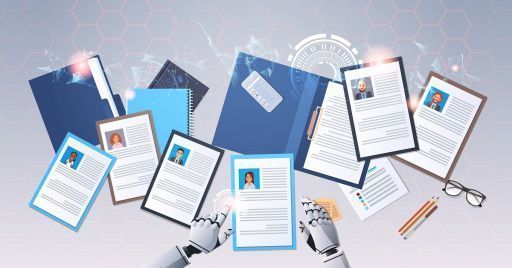
The impact of technology on HR management

What is the impact of technology on HR management? How does it affect the decision-making processes and working lives of HR professionals?
In recent years, the impact of technology on HR management has radically changed the way HR professionals work.
Before mobile apps and the cloud, HR was defined by piles of paperwork and a constant struggle to keep up with hiring and compliance. By streamlining many of these processes and automating repetitive tasks, technology has greatly improved the efficiency, accuracy and even morale of HR professionals, allowing them to focus on more strategic issues.
But where does technology have the biggest impact on HR? Let's find out together.
1. Artificial Intelligence driven recruitment
Artificial intelligence-enabled software has huge potential when it comes to recruitment, as it can eliminate many manual tasks, speeding up the selection process. From automatic CV selectors to chatbots that conduct interviews with candidates, there are many tools that can reduce or even remove time-consuming tasks.
At the same time, such advanced systems allow us to understand people's profiles at an unprecedented level, drawing on increasingly diverse sources.
2. Cloud-based human resources
Remote working is fast becoming the new normal. In this context, people management processes are moving to cloud-based systems. Cloud technology improves business continuity, provides greater flexibility and allows remote teams to centralise data and limit losses. Cloud-based HR software also creates transparency: when data is stored in the cloud, anyone with the appropriate credentials can access the data anytime, anywhere.
3. Tailored learning
Technology is also rapidly changing the nature of work. Many professions are disappearing, others have profoundly changed and others will appear on the horizon. In this context, it is crucial to prepare workers for change. This is where the importance of HR software that can customise learning and skills development paths comes in. Tools such as enterprise LMS, microlearning and adaptive learning will be crucial.
4. Employee wellbeing
Employee wellbeing strategies are receiving increasing attention from employers and, here too, technology is proving crucial in facilitating such initiatives. For example, technology can be used to encourage flexible working, to facilitate internal communication and team collaboration, even remotely, or to automate and reduce repetitive tasks.
But that's not all: more and more companies are looking for an integrated approach to the physical, mental and emotional health of employees. For example, companies are integrating tools for the mental wellbeing and health of employees into their human resource management software.
5. Virtual reality
Virtual reality is rapidly transforming a range of industries and HR is no exception. Processes such as interviews, simulations and even onboarding are all aided by virtual reality. As the world becomes increasingly remote and social distances continue to be the norm, this technology will certainly help bridge the gap between people. But that's not all: increasingly, virtual reality is also being used in corporate training.
6. Data analysis
Investing in data analytics technology allows HR professionals to access more accurate data and reporting and to gain a better understanding of the functioning of production processes and employee performance, as well as to predict future behaviour (retention rates, absenteeism, etc.).
Data technology in HR therefore improves the quality of business decisions and helps to drive performance.
But that's not all: the use of technology tools for data analysis enables the automation of certain repetitive actions by HR professionals, who can then focus on strategic, high-impact activities.
Translated with www.DeepL.com/Translator
Did you like this article? Sign up for the newsletter and receive weekly news!
Subscribe to NewsletterComments:
No comments are in yet. You be the first to comment on this article!